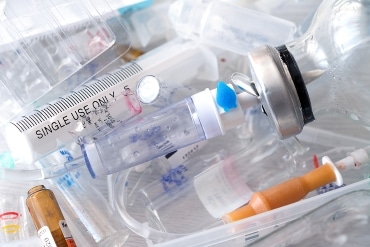All Points Medical Waste Blog
Managing Pharmaceutical Waste: Best Practices for Compliance
 Pharmaceutical waste presents unique challenges for healthcare facilities across Florida. Unlike regular medical waste, expired medications and unused pharmaceuticals require specialized handling to protect both public health and the environment. Understanding these requirements isn’t just about following regulations—it’s about protecting your practice from costly violations and ensuring patient safety.
Pharmaceutical waste presents unique challenges for healthcare facilities across Florida. Unlike regular medical waste, expired medications and unused pharmaceuticals require specialized handling to protect both public health and the environment. Understanding these requirements isn’t just about following regulations—it’s about protecting your practice from costly violations and ensuring patient safety.
The complexity of pharmaceutical waste regulations often catches healthcare providers off guard. Between DEA requirements, EPA guidelines, and Florida state regulations, staying compliant requires more than good intentions. It demands a systematic approach that addresses every aspect of pharmaceutical disposal, from initial segregation to final destruction.
Understanding Different Types of Pharmaceutical Waste
Not all pharmaceutical waste is created equal. The disposal method depends entirely on the specific characteristics of each medication, making proper identification the foundation of compliant waste management.
- Non-controlled substances represent the majority of pharmaceutical waste in most healthcare settings. These include over-the-counter medications, expired antibiotics, and non-narcotic prescription drugs. While they don’t fall under DEA oversight, they still require proper disposal to prevent environmental contamination and accidental ingestion.
- Controlled substances face the strictest regulations due to their potential for abuse and diversion. Schedule II through V medications must be handled according to DEA requirements, including detailed documentation, witness requirements, and specific disposal methods. The paperwork alone can overwhelm practices that aren’t prepared.
- Hazardous pharmaceutical waste includes chemotherapy drugs and other medications that pose environmental or health risks. These materials often require specialized treatment before disposal, and improper handling can result in significant penalties from both state and federal agencies.
Our hazardous waste disposal services help Florida healthcare providers navigate these complex requirements while maintaining full compliance with all applicable regulations.
Establishing Compliant Disposal Procedures
Creating effective pharmaceutical waste procedures starts with staff training. Every team member who handles medications must understand proper segregation, storage, and documentation requirements. This isn’t a one-time training session—it’s an ongoing education process that adapts to changing regulations and new medications.
- Segregation at the point of generation prevents compliance problems before they start. Separate containers for different waste categories ensure that controlled substances don’t accidentally mix with regular pharmaceutical waste. Clear labeling prevents confusion and demonstrates your commitment to proper handling during inspections.
- Secure storage protects controlled substances from theft while awaiting disposal. DEA requirements specify secure storage conditions that prevent unauthorized access while maintaining an accurate inventory. Many practices underestimate these security requirements until they face their first inspection.
- Documentation creates a paper trail that proves compliance. Every step of the disposal process requires accurate records, from initial segregation through final destruction. Missing paperwork can turn a routine inspection into a major compliance issue, regardless of actual disposal practices.
For healthcare providers managing multiple waste streams, our biomedical waste services provide comprehensive solutions that address both medical and pharmaceutical disposal needs under one program.
Working with Licensed Disposal Companies
The right disposal partner makes pharmaceutical waste compliance manageable rather than overwhelming. Licensed medical waste companies understand the regulatory landscape and provide the documentation necessary for audit protection. This partnership approach transforms complex regulations into routine business processes.
Proper credentials should be your first consideration when evaluating disposal companies. DEA registration, state permits, and insurance coverage protect your practice from liability while ensuring compliant destruction. Don’t assume all medical waste companies handle pharmaceuticals—many lack the specialized permits required for controlled substance disposal.
Destruction methods vary depending on the type of pharmaceutical waste involved. High-temperature incineration, controlled substance destruction, and specialized treatment processes each serve specific purposes. Understanding these options helps you make informed decisions about your disposal program.
The convenience of working with a single provider for multiple waste streams cannot be overstated. Rather than coordinating with multiple vendors, comprehensive programs streamline compliance while reducing administrative burden. Our veterinary medical waste services demonstrate how specialized providers can address unique pharmaceutical disposal needs across different healthcare sectors.
Staying Ahead of Regulatory Changes
Pharmaceutical waste regulations continue evolving as new medications enter the market and environmental concerns grow. Staying current requires ongoing attention to federal, state, and local requirements. What worked last year might not meet today’s standards.
Regular compliance audits help identify potential issues before they become violations. Internal reviews of disposal procedures, staff training records, and documentation practices reveal gaps that need attention. Professional compliance training programs keep your team current on changing requirements while providing documentation of your commitment to proper procedures.
For Florida healthcare providers looking to streamline their pharmaceutical waste management, our compliance training programs provide the knowledge and documentation necessary for confident compliance across all waste streams.
Don’t let pharmaceutical waste compliance become a source of stress for your practice. Partner with experienced professionals who understand Florida’s unique regulatory environment and can guide you through every aspect of compliant disposal.
Call All Points Medical Waste at (772) 600-4885 or complete the form on this page today to discuss comprehensive pharmaceutical waste solutions that protect both your practice and the communities you serve.

